A Glimpse Into the Life of a High-Ranking Daughter in 'The Handmaid's Tale'
This article does not go over plot points or anything that would traditionally be considered a spoiler. But it does provide a closer look at Gilead society, and most of the source material comes from The Testaments.
Hannah Bankole is getting older, and it looks like she's reached puberty. We can't be sure of her age, but estimates put her somewhere around 12-13 years old, which would make sense because the average female is capable of getting pregnant around that time.
It's well known that older, more traditional societies were quick to marry girls off. Many would start hunting down suitors at first blood, eager to reap the many advantages of pushing their daughters out of the nest. Gilead is no different. We've all seen the bright-eyed adolescent faces, one by one, revealed during weddings, many of them no older than 13 or 14.
This is a society obsessed with pregnancy and female oppression. The Sons of Jacob justified the holocaust and slave trade by pointing at the birthrate, declaring that they were only doing what needed to be done to replenish the human race. It was a time of urgency and fanaticism, and it showed.
The female experience changed drastically on every level of society in Gilead. Women were robbed of the freedom to read and write. Their activities were often confined to harsh labor or domestic arts. They were oppressed, largely due to Gilead's prejudice against them.
In an effort to justify their treatment of women, Gilead borrowed from ancient Europe, blaming women for their inability to reproduce. They said it was God's punishment for pornography, sex work, contraception, abortions, and sex before marriage. A society that permitted those things was subject to Old Testament judgment, resulting in the plague of infertility.
Hannah was born into a world where women could be whoever they wanted. But she grew up in a world where women were treated like animals, penned and enslaved, unable to defend themselves. Most were no better than commodities to be passed around and traded. Her experience would've been vastly different from what we are used to.
The series hasn't explored that experience much. Daughters have long been considered prisoners, naive and misled, always off-limits. Children were coveted, so they were secreted away and largely sheltered from the rest of the world.
Fortunately we have been given glimpses of what life would be like for them, and it's time we started learning more. There's only so much they can fit into 10 episodes. We won't really get to see their lives on film.
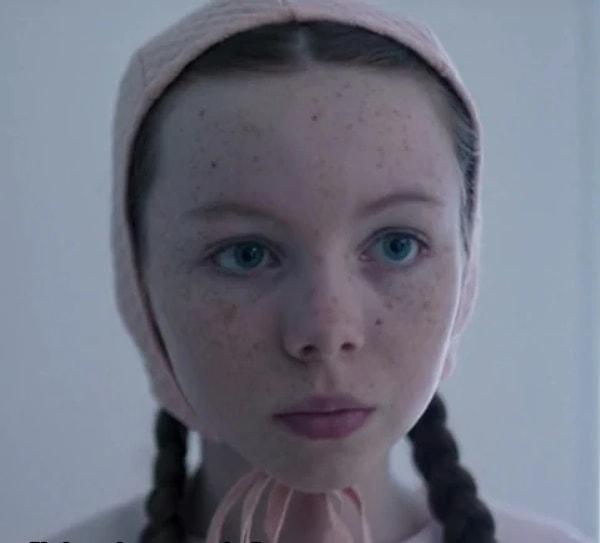
Courtesy of Hulu
Women Do Receive An Education But It's Nothing Like What We're Used To
In pre-modern times biological myths were created to justify the oppression of specific groups of people. They were vulgar and demeaning, an unspeakable slap in the face, suggesting that they were closer to animals, that abuse was good for them, and that they had a rightful place ordained by God.
Gilead was different. They had a way of painting things to make them seem elegant, like the constant flower vases and Victorian furnishings we're so used to in the show. But they still relied on pseudo-science to justify oppression, and it wasn't very well thought out. But it didn't have to be for people to believe it. LIke it or not, we're all slaves to propaganda.
They told women that their brains were damp, smaller, and softer, but also warm and enveloping--completely the opposite of the brains of men, which were tougher. more focused, and larger, capable of understanding men's things. This included literacy, leadership, building, or anything that traditionally falls into the category of men's work.
They said that trying to teach women about men's things would be like trying to teach a cat to crochet. It was against their nature. That's why women and men had separate educations.
They were told not to be too curious or to think too much about their differences. The imagination could get them into trouble. That's why Eve ate the apple from the tree: too much imagination.
In short, don't think. Don't wonder. This is the way things are. Be happy with it.
Schools were divided by class level. We know little about the education of the econo-wives, just that the courses they were offered were more pragmatic, suited to the lives of working men and women. Upper-class women learned the arts. Lower-class women learned how to make clothes and sew patches. Whenever the lower classes were mentioned there was a sense of disgust. They were seen as ugly. Their clothes were a ghastly color. Their lives were much worse than the daughters of commanders. They probably learned how to operate machinery, work in a factory, and produce fabric. But we don't know.
At a younger age, high-ranking daughters were taught how to embroider, how to crochet and knit, how to paint, as well how to do basic mending. There was a level of prowess involved. They went above and beyond, learning to become artists in their own right. There were no fingerpaintings or crooked handkerchiefs, not at a certain level.
It got to the point where it was obvious that the aunts, who were responsible for teaching the girls, were overcompensating for the fact that there wasn't much to teach them. There was no literature, no math, no history, so the girls were forced to delve deep, receiving what must've been the equivalent of a college degree in fashion design and culinary arts. There are American chefs that would baulk at their skills.
Of course, arts and crafts, cooking, and sewing were all heavily laden with scripture and propaganda. There was symbolism, Bible stories, and lessons to be learned.
The main purpose was to prepare the girls to accept their place in society. The aunts wanted them to be obedient, and they also wanted them to be able to cope and stay safe. They didn't want to see stonings, salvaging, and drownings. They wanted to see happy households. So the curriculum was developed to help them become square pegs that fit nicely into square holes.
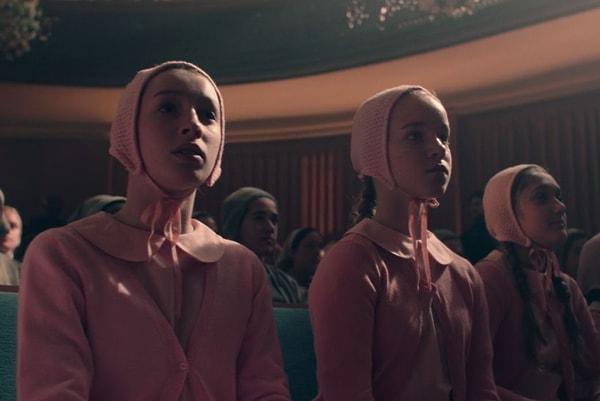
Courtesy of Hulu
The Culture of Sex in Gilead
Sex in Gilead is meant to be simplified. It's their duty to god, confined to husbands and wives, or husbands and handmaids. We don't know much about sexual education. We know that it occurs right before adolescence. The girls are shown charts, but it's very confusing to them.
Considering the other propaganda they're exposed to, it's probably done by using symbols like flowers and pistons. But we can't be sure. What we do know is that they're told very little of their own biology. They don't know what will happen to themselves when they become aroused. There's an example of them being disgusted by wetness, but none of the other girls know what that means. One of the girls considers herself to be a giant set of holes. She expresses that whatever hole she has is meant to be filled over and over, and it disgusts her. It disgusts all of them. That's what she thinks it means to a woman--someone to be dominated and filled, used like an object. She's right.
Younger girls are taught that they're beautiful flowers and that they have to be careful around menfolk. They're innocent and pure, but they're also the embodiment of sinful nature capable of sending men into a frenzy. If they're not covered up or modest, someone will come and tear off all of their petals, soiling them and making them unfit.
This might mean that wives are expected to be virgins. But most girls break their hymen at a very young age--often from physical activity--so it's unlikely that they're inspected before their weddings. They aren't inspect when they reach adolescence, and we're talking about the daughters of powerful men and women. Station, rank, and social status matter in Gilead, so if a bride is found wanting, the corrupt nature of that world likely trumps those expectations. Weddings were considered auspicious occasions. Nobody is robbing the upper classes of that.
The girls spend their entire lives in a world where men can touch them, hurt them, push them around, beat them--do anything they want, and there's absolutely nothing they can do about it. Even the aunts, who seem to be compassionate in such matters, can't take action, and they rarely do.
So when the time comes for the girls to be married off, there's a lot of emotion. Since daughters are mostly kept under lock and key, they're used to seeing men with guns; they're thugs, Eyes, and Guardians. They don't want to be around these creatures at all, much less forced into an intimate situation with them. It's like being stuck in a cage with a lion.
This is also because they spend most of their lives being warned about sex and lust. It's all veiled with elegant symbolism, but the message is clear, then one day, the message changes, and they're forced to reckon with the proposition of marriage.
The result is panic attacks, regular suicide attempts, and all of the other physical symptoms that can manifest from extreme phobias and distress. Many girls do in fact kill themselves, while others go through bouts of extreme suicidal ideation. Most are drugged at the time of their wedding to make it easier for the men to consummate the marriage. Some are turned into Aunts, but that is rare.
There's another problem we rarely talk about. Women in our culture are free to enjoy sex. But in Gilead, they're told to lie down, pull a sheet over their bodies and bite their lip. They could undergo a clitorectomy. There might be abuse. There are no courses on how to treat a woman. So sex is redefined; it's a form of torment, not lovemaking. They know they're going to suffer, and they will never be appreciated. The best they can hope for is a good home, and in that way, their prospects are similar to that of a handmaid.
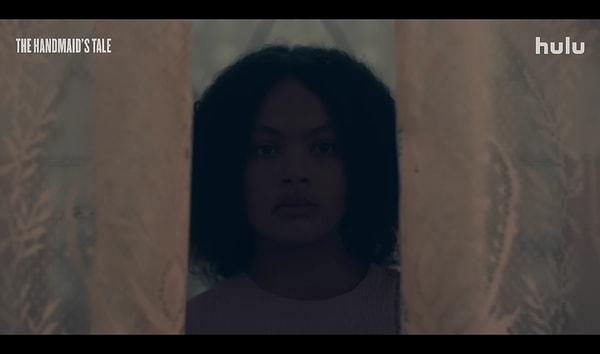
Courtesy of Hulu
What Happens When Girls Reach Adolescence
The aunts in Gilead--at least according to The Testaments--lord over all things female. They're teachers, midwives, and red center enforcers, and they oversee female colonies. They also help arrange marriages. When a girl reaches what Gilead considers to be womanhood, which occurs at the beginning of puberty, she is inspected by a group of aunts.
They come into the home, sum them up--almost as if they're livestock, checking their teeth and their appearance. The girl is mostly left out of the process. The aunts focus on the mothers, requesting a donation, and going over the child's prospects for a favorable match. In the end, the choice is left up to the wife, though the commanders do have a hand in things.
Marriage is rushed in Gilead for a number of reasons. Nobody involved wants the child to fall in love, and they definitely don't want the girl losing her virginity. Sex before marriage is punished by stoning. Girls at that age are starting to discover boys. The idea is that the sooner the marriage happens, the sooner that can be prevented.
Some families pad girls' chests so that when the aunts come to inspect them they seem older. It's not fully understood, but there seems to be some incentive involved in marriages. Gilead society is defined by its corruption. Backdoor deals are most certainly commonplace. There's also rank to consider.
When a daughter is married off to a high-ranking member of the leadership, she becomes somebody. Her family is associated with a famous name, meaning they also receive a certain amount of recognition. If you're the mother of the leader of the district, you have some pull, at least theoretically.
After the inspection, the aunts go about arranging suitors, similar to the way they find match commanders with handmaids. Younger girls seem to be preferable to older ones. Commanders want them fresh, so as the girl gets older her prospects dwindle. If she reaches the age of 18, she's officially old maid status, and things get desperate.
The girl is kept home from school and transferred into Rubies Premarital Preparatory Academy, which was given the motto, 'Who can find a virtuous women? For her price is far above rubies.'
It's a disgusted place, tainted by the girls' refusal to accept their fate. Some are happy to get married, but there's still blood and hysterics.

Courtesy of Hulu
School For Wives
We learn a lot about wifehood in the few scenes that take place in Rubies. Graduation into Rubies occurs at the time of puberty. So the girls all enter into the school at different times. Their tenure at Rubies is said to be short. They're all being marketed to various suitors, who can snatch them up whenever they see fit. The wait could be months or weeks. It all depends.
Their pre-wife education is based around what it means to be the mistress of a household. There's classes in culinary arts--how to tell the difference between a bisque and a potable, at what temperature to serve a quiche, which forks to use, and how to judge the quality of their food. They're reminded that Gilead can face times of scarcity, so they're taught the proper way to handle that. They're also taught mealtime prayers, so they can say them when their husbands are absent.
The idea is that they need to know how to lord over their household, and ensure that it meets certain standards and expectations. There's a way to live, a certain style and decorum, and that is absolutely essential if they want to survive Gileadian high society. The aunts set the standard. Wives enforce it in their own homes.
Wives are like actresses on a stage, they're told. There's a certain way they're to carry themselves, a certain manner of speech, and a certain way to present themselves to their husbands. It's a way of controlling everything they do, modeled after finishing schools and the long forgotten days when housewives were taught how to manage themselves. During the 50s, they were given a certain routine, and a set of daily tasks--ironing, cooking, dishes, etc.
That protocol is long gone, so most of us would see it as completely alien. But this type of propaganda has a firm basis in history.
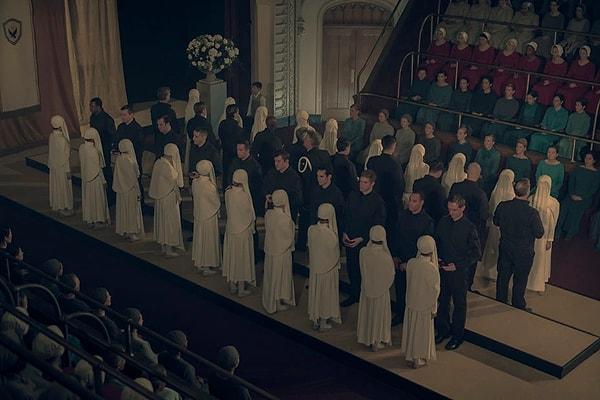
Courtesy Hulu
Marriage Meant Lifelong Servitude
There's a phrase that many fans might remember from season 4. 'Wives have bad things too.'
Gilead in The Testaments is ruled a hypocritical group of grandstanders who build themselves large, abusive estates that would make southern plantations look like hippie communes.
They pretended to be men of God, biblical scholars, and philosophers. But behind the scenes, they were ugly and vicious. They did things that no modern man could get away with. They poisoned unruly wives. They beat them--as was their right. They locked them up, cheated on them, and treated them like children.
Life as a wife could be worse than that of a handmaid. At least handmaids got to leave abusive households. Marriage was eternal.
The girls had no choice who they married. Old men were common. They were slaves to their whims, sexual or otherwise, and they were forced into the household protocols and behavioral norms setup in wive's school.They had to put on a smiling face, because anything else would reflect badly on their family name. Gilead was all about social convention and reputation. A commander with a rebellious wife could end up under suspicion and possibly end up on the wall.
The wives were robbed of the ultimate joy in life. If they strayed or fell in love, they could be sent to the colonies or turned into a handmaid. So while their male counterparts could sleep around and have affairs, they were stuck, forced to devote themselves to monsters. It was hellish, and nobody would be there to comfort them or defend them. Gilead turned a blind eye to the abuses they faced. Nothing could possibly be worse.
Hannah is facing the proposition of become a wife now. She understands what it's like, what will be expected of her, and what her fate will be. It's hard to imagine the dread she must be feeling. No future, no hope, just a life of slavery. Let's hope that June can find a way to pull her out before it's too late. If she's wearing purple, she's already being marketed to various suitors.
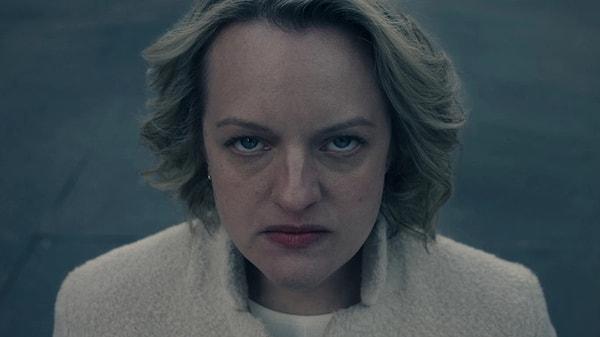
Courtesy of Hulu
We're Entering Hannah's World
The Handmaid's Tale was recently renewed for a sixth and final season, which for many is a reason to grieve. The show has been a source of comfort and catharsis for the fandom. We've followed an unimaginably tense journey, and it's going to be hard to give it up. But this will not be the final chapter in the saga of Gilead.
Ann Dowd and the showrunners have confirmed that there will be a spin-off based on Margaret Atwood's sequel, The Testaments. This show will be centered around Hannah, Nichole, and Aunt Lydia, and if it follows the source material, it should give us a glimpse into the life of a daughter. But that might not be the case.
Season 5 is showing parts of the timeline that focus mainly on Hannah's life with the Mackenzies, and it's not from her point of view. They could skip her education and early life altogether. We might not see wive's school or her transition into adolescence.
If we want to learn about that world, we may have to pick up a copy of The Testaments. It's a compelling read, and it might just be our main chance to get a closer look at the life of a daughter. I highly suggest it.
Keşfet ile ziyaret ettiğin tüm kategorileri tek akışta gör!

Send Comment